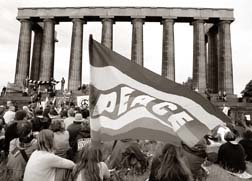|
DAILY NEWS ONLINE |
|
|
|
OTHER EDITIONS |
|
|
|
|
|
|
|
|
|
OTHER LINKS |
|
|
|
|
|
|
 |
|
|
|
|
"Let's use fun to spread peace!" This slogan which is blared forth at 'Live 8', "the biggest music show on earth," which has just been launched in a series of Rock-Pop music concerts across the continents, aims at focusing on the situation of the poverty-stricken millions of Africa.
Reports said that the musicians would be snapping their fingers every three seconds while on stage to indicate the frequency at which a child dies due to poverty somewhere in the world.
The immediate backdrop to this epochal happening in the music world is the G-8 summit opening in Gleneagles, Scotland on Tuesday, which is already coming under unprecedented public pressure in the West to "make poverty history," by bringing immediate relief to Africa's deprived populations, reeling under endemic poverty. At least 100,000 demonstrators have already converged on Gleneagles to impress on the world's mightiest economic powers - including Japan - the need to make drastic, concrete moves to "make poverty history".
The public protest, we are told, would run in tandem with the Rock-Pop music concerts, to dramatize the plight of the poor, in an unprecedented, people-powered drive to stir the conscience of those who hold the world's purse strings.
The music component of the demonstration is the brainchild of Western pop music icon, Bob Geldof, who in 1985, orchestrated the now famous "We are the World" musical extravaganza aimed at highlighting the dire condition of the African child, dying relentlessly in the stranglehold of poverty.
Such massive outpourings of public concern in the West in particular, for the "Wretched of the Earth," are the proof we have that all is not lost in terms of awakening the conscience of the world to the continuing, unalleviated, problem of poverty but the hope of those awaiting real change is likely to be that this time round pious wishes would be translated into concrete, poverty eradication measures.
Hopefully, the G-8 would be stirred into positive action by their publics and we would see - to begin with - a meeting of the commitment made long ago, by the world's richest countries to siphon 0.7 percent of their national income towards shoring-up the economies of underdeveloped countries.
This aid pledge would need to precede all other anti-poverty measures, such as working towards the UN-sanctioned Millennium Development Goals, if a dent is to be made in the lingering poverty issue which results in some 29,000 children dying yearly around the world in a condition of extreme deprivation.
While demonstrations of public support for the cause of eradicating global poverty are most welcome and are, in fact, necessary, the defenders of social justice everywhere are likely to wish that a process would, from now on, take place to ensure the true empowerment of the world's poor, globally as well as at the level of national societies.
It is a change in the power balance between the rich and the poor-globally as well as locally - resulting in the poor wielding more power, which would see a change for the better in the condition of the underprivileged and deprived.
It just wouldn't do to only demonstrate one's sense of outrage at the continuing poverty crisis. Those demonstrating at Gleneagles, for instance, need to ensure that the poor in their societies are truly empowered when they get back to their home countries. The poor would need to be strong parties to decision-making both at global and local levels, if progress is to be made in the direction of poverty alleviation.
National socio-political systems and global society should be democratized to such a degree that the voice of the poor is not only heard at such levels but also acted on. If not, we would be having endemic poverty and violence as the case of Nepal, for instance, so graphically demonstrates.
|
|


